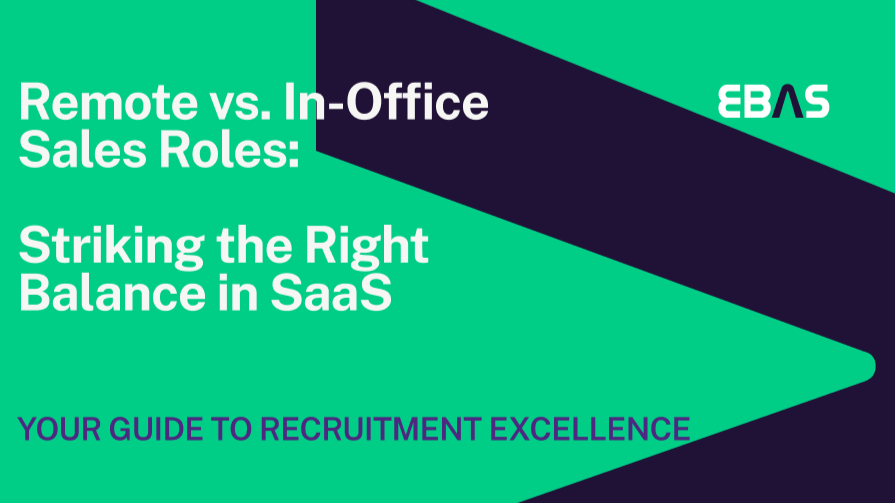Remote vs. In-Office Sales Roles: Striking the Right Balance in SaaS

Remote vs. In-Office Sales Roles: Striking the Right Balance in SaaS
The rise of remote work has revolutionized the workplace, offering SaaS companies access to broader talent pools and providing employees with flexibility like never before. Yet, not everyone is convinced. Some employers argue that in-office work is essential for fostering collaboration, team dynamics, and optimal performance in sales roles.
This ongoing debate—remote versus in-office—has sparked friction between candidates who value flexibility and companies that prioritize in-person interaction. So, what’s the right answer? Like most things in business, the truth likely lies somewhere in the middle.
Let’s dive into the pros and cons of remote and in-office sales roles and explore how SaaS companies can strike a balance that benefits both the business and its people.

The Case for Remote Sales Roles
Remote work isn’t just a perk anymore—it’s an expectation for many professionals. For SaaS companies, embracing remote sales roles has opened up new opportunities to attract top talent, reduce costs, and improve employee satisfaction. Here’s why:
1. Broader Talent Pools By offering remote roles, companies can recruit from anywhere, accessing a wider range of skilled candidates. This is particularly valuable in competitive markets or regions with a limited talent pool.
2. Increased Flexibility and Productivity Many sales professionals thrive in remote environments where they can structure their day around customer needs rather than office hours. Without the distractions of a physical office, some even report higher productivity.
3. Cost Savings For companies, remote work can mean significant savings on office space, utilities, and other overhead costs. For employees, it eliminates the time and expense of commuting, contributing to a better work-life balance.
4. Employee Satisfaction and Retention Flexibility is a top priority for today’s workforce. Remote work options can boost morale, reduce burnout, and improve retention, particularly for sales professionals who value autonomy.
Pro Tip #1: Embrace remote work to attract top talent but set clear expectations for communication, performance, and collaboration to ensure team alignment.

The Case for In-Office Sales Roles
While remote work offers undeniable benefits, many companies still see value in bringing their sales teams together in person. Sales, after all, is often about energy, collaboration, and relationship-building—qualities that some believe thrive best in a shared physical environment.
1. Enhanced Team Dynamics Being in the same room fosters real-time collaboration, spontaneous idea-sharing, and a stronger sense of camaraderie. For new hires, in-office work can accelerate onboarding and help them integrate into the team culture.
2. Easier Mentorship and Training Junior sales professionals often benefit from being surrounded by experienced colleagues. In-office settings make it easier to shadow senior reps, receive immediate feedback, and learn through osmosis.
3. Building a Strong Sales Culture Sales floors often thrive on energy and competition. In-person work can create an environment where reps feed off each other’s success and motivation, which is harder to replicate remotely.
4. Improved Communication Face-to-face communication can reduce misunderstandings, build trust, and foster deeper connections. This can be particularly important for team cohesion and alignment on goals.
Pro Tip #2: For in-office roles, focus on making the workplace engaging and collaborative. Foster an environment where people want to be, rather than feel obligated to show up.

Balancing the Two: Hybrid Models and Flexibility
With compelling arguments on both sides, many SaaS companies are turning to hybrid models that combine the best of remote and in-office work. This approach allows employees to enjoy the flexibility of remote work while still benefiting from in-person collaboration when needed.
1. Define Clear Expectations In a hybrid model, clarity is key. Outline when employees are expected to be in the office and when remote work is acceptable. For example, in-office days might be reserved for team meetings, training sessions, or collaborative projects.
2. Focus on Outcomes, Not Location Whether employees are remote or in-office, performance should be measured by results. Sales roles are naturally goal-oriented, so focus on metrics like revenue, client engagement, and pipeline growth rather than where the work is done.
3. Invest in Collaboration Tools For hybrid teams to succeed, seamless communication is essential. Invest in tools that facilitate collaboration, whether through video conferencing, CRM platforms, or virtual team-building activities.
4. Prioritize Flexibility Recognize that different roles and individuals may require different approaches. Some sales reps may thrive remotely, while others prefer the structure of an office. A flexible policy ensures you can accommodate diverse preferences and needs.
Pro Tip #3: Poll your sales team to understand their preferences and challenges with remote, in-office, or hybrid models. Use this feedback to craft policies that support both productivity and morale.

Navigating the Friction Between Employers and Candidates
The divide between candidates who want flexibility and companies insisting on in-office roles is real. To navigate this tension, SaaS companies must communicate their policies clearly and position them as part of a broader value proposition.
1. Be Transparent in Job Descriptions Candidates value honesty. If a role requires in-office attendance or offers remote flexibility, make this clear in job postings to set the right expectations from the start.
2. Highlight Benefits Beyond Location Whether your roles are remote or in-office, emphasize other perks like professional development opportunities, competitive compensation, or a strong team culture.
3. Listen to Your Team If existing employees are pushing for more remote options, take their feedback seriously. Employee satisfaction is directly linked to retention, and ignoring these concerns could result in losing top talent to more flexible competitors.
Pro Tip #4: Turn remote work into an opportunity to differentiate your employer brand. Highlight how your policies prioritize both flexibility and performance to attract top-tier candidates.

Final Thoughts: Building the Future of SaaS Sales Teams
The debate over remote versus in-office sales roles doesn’t have a one-size-fits-all answer. Each company’s approach will depend on its culture, goals, and the unique needs of its team. What’s clear, however, is that flexibility is no longer a “nice-to-have”—it’s a competitive advantage in today’s job market.
By balancing the benefits of remote work with the strengths of in-office collaboration, SaaS companies can create environments where sales professionals feel supported, motivated, and empowered to succeed. Whether you opt for a remote, in-office, or hybrid model, the key is to prioritize clear communication, trust, and outcomes over rigid policies.
After all, the best sales teams aren’t defined by where they work—they’re defined by the results they deliver.

EBAS specializes in helping SaaS companies navigate the challenges of building effective sales teams, whether they are remote, in-office, or hybrid. Here’s how we can support you:
- Crafting Tailored Workforce Strategies: We work with your leadership team to determine the best model for your sales force, whether that’s fully remote, fully in-office, or a hybrid approach. Our strategies prioritize flexibility while ensuring optimal performance.
- Access to a Broader Talent Pool: By leveraging our extensive network, we help you source top-tier sales talent from across the globe, opening up access to skilled candidates who excel in both remote and in-person roles.
- Building Collaborative Teams: For hybrid and remote setups, we assist in identifying candidates who thrive in virtual environments and excel at self-management, while also integrating tools and practices to foster team cohesion and collaboration.
- Retention-Focused Solutions: Whether your team is in-office or remote, we help create policies and incentives that boost morale, increase engagement, and reduce turnover—key factors for long-term success.
- Employer Branding for Flexibility: We help position your company as an employer of choice by emphasizing your commitment to flexibility, performance-driven policies, and team support in your hiring process.
At EBAS, we understand that the future of work is dynamic. Our expertise ensures your sales team is not only high-performing but also aligned with the needs of your business and workforce. Let’s talk about how we can help you find the perfect balance for your sales roles.

Read Next
Learn the top habits for sales success. From active listening to time management, discover how to boost your sales skills and close more deals.
Discover key strategies for hiring tech sales professionals, from asking the right questions to fostering a relaxed interview atmosphere.
Explore the future of hiring with The EBAS Hiring Edge — expert insights on recruitment trends, talent strategies, and employer branding for 2024 and beyond.
Hire Top Sales Talent in 21 Days—On Track to Hit Your Targets in 90 Days
Discuss next steps to start recruiting.